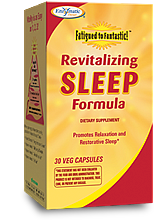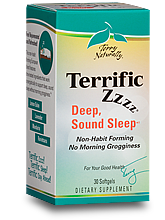6 Signs You Need More Sleep

A national study on sleep in the United States found that many Americans, while recognizing the importance of sleep, fail to prioritize daily sleeping habits in their everyday lives. With more demanding work hours and technology easily at our disposable, it's no wonder we're a sleep-deprived society. While everyone's sleep needs vary depending on factors like individual needs and environment, sometimes the rhythm of our day-to-day lives can throw off our circadian rhythm, making it hard to reset it naturally. See how many hours a night leaves you feeling the best and how long you sleep when you don't set the alarm clock. This will tell you what is right for you.
Meanwhile, inadequate sleep can cause a number of surprising problems beyond simply being tired, which is why many people are searching for natural ways to fall asleep and stay asleep, a few of which include herbs, nighttime rituals and supplements. If you have one of the problems below, you're most likely not getting enough sleep.
1. Fatigue and Brain Fog
Brain fog has recently been linked to food — whether due to deficiencies or intolerances — but it can also show up when you're low on sleep. Chronic fatigue and brain fog can go hand in hand when your body hasn't received enough sleep.
2. Aches and Pains You Can't Account For
Human growth hormone (HGH) is a complex protein produced by the pituitary gland in your brain. It is released into your bloodstream while you sleep in order to help repair and restore your body's tissue. If you aren't getting enough sleep, you aren't getting enough HGH and your tissue isn't repairing sufficiently, which will leave you much more likely to feel achy.
3. Difficulty Losing Weight
Low growth hormone levels from poor sleep also leads to greater fat accumulation and reduced muscle mass. Studies have shown that inadequate sleep is associated with an average 6 ½ pound weight gain, and 30% increased risk of obesity. HGH also helps slow the aging process, so the development of wrinkles on your face could also be a sign that you're not getting enough sleep.
4. Catching Colds That Seem to Last Forever
Poor sleep will weaken your immune system. If you catch frequent colds that drag on and on, insufficient sleep could be the reason.
5. Nodding Off During the Day
Although you might normally be tired during the day, falling asleep in front of the TV while it's still light outside, or feeling as though you're going to fall asleep while driving, can indicate the presence of sleep apnea. Sleep apnea is a sleep disorder characterized by momentary pauses in breathing or shallow breathing while you sleep, typically followed by loud snoring. If you're both overweight and have high blood pressure, and you fall asleep easily during the day, you may have sleep apnea.
6. Night Sweats
Unusual sweating at night while you sleep, or "night sweats," can indicate inadequate estrogen woman or testosterone in men. It can also reflect night time acid reflux, infections, or drops in blood sugar while sleeping. The latter suggests adrenal fatigue, which is likely present if you get "Hangry" during the day (angry when hungry). This can be helped by nutritional support.
How to Make Time for More Sleep
Take a weekend and allow yourself nine hours sleep each night and see the difference in how you feel afterwards. Then cut out some of the things you've been spending time on in your life that you don't really enjoy (like watching some news networks that overly dramatize reporting just to keep viewers stoked with fear and at each others' throats, or business meetings that you don't really need to go to). Use this free time for sleep instead. Then try varying the number of hours you sleep each night to find what amount leaves you feeling best.
Herbals that Support Better Sleep
Two of my favorite herbal mixes to help improve sleep are the Revitalizing Sleep Formula and Terrific Zzzz™. These can be taken together and with any sleep medications.
For more resistant insomnia, CBD and other hemp components (cannabinoids) have been shown to help pain, sleep and anxiety. Marijuana has cannabinoids that are very helpful for these. But you don't have to get arrested or be a zombie to get a good night's sleep. Similar benefits can be obtained from hemp oil, taking 10 to 50 milligrams of CBD at bedtime. This is available legally over the counter, but be sure to look for a hemp oil that is 20 percent CBD. Although there are many good brands out there, this is a case of buyer beware.

Jacob Teitelbaum, M.D. is one of the world's leading integrative medical authorities on fibromyalgia and chronic fatigue. He is the lead author of eight research studies on their effective treatments, and has published numerous health & wellness books, including the bestseller on fibromyalgia From Fatigued to Fantastic! and The Fatigue and Fibromyalgia Solution. His newest book (June 10, 2024) is You Can Heal From Long COVID. Dr. Teitelbaum is one of the most frequently quoted fibromyalgia experts in the world and appears often as a guest on news and talk shows nationwide including Good Morning America, The Dr. Oz Show, Oprah & Friends, CNN, and Fox News Health.



